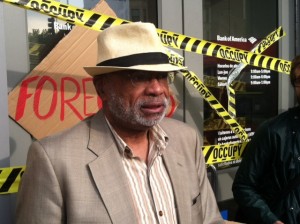Listen to Rev. Vanzant
Audio clip: Adobe Flash Player (version 9 or above) is required to play this audio clip. Download the latest version here. You also need to have JavaScript enabled in your browser.
“This is the next phase of the Occupy movement,” said Mike Haack, an activist with Occupy Our Homes, an off-shoot of Occupy DC which works to prevent evictions. With bullhorn in hand, Haack and others stood outside Bank of America in D.C.’s Columbia Heights neighborhood. The bank, which was supposed to be open, was temporarily “foreclosed.” Activists said they simultaneously shut down eleven Bank of America branches Saturday morning in an effort to raise awareness about the possible eviction of a long time District resident from his northeast D.C. home.
“I would love to keep my home,” Rev. Robert Michael Vanzant told protesters as he stood outside Bank of America, which foreclosed on his home of more than twenty years in 2010. In early September, Occupy Our Homes activists gathered outside Bank of America’s mortgage loan office on U Street to protest Vanzant’s case, but he didn’t show up. He couldn’t. He was hospitalized. “They believe it was some sort of stroke,” said Vanzant, who suffers from several progressive illnesses, which have not been helped by the stress from the threat of eviction.
Thirty years ago, Vanzant started Faith Temple, where he now serves as outreach pastor. In a Washington Post op-ed, Vanzant called the church “a historic safe space for the LGBTQ community of color… where they could go to without the fear of violence they often faced in the streets, schools, workplaces and churches.” Faith Temple does not have its own place, but instead shares a space with New York Avenue Presbyterian Church. This has led Vanzant to open up his home which doubles as a religious and community center. “We hold Bible study there. We hold church events there. Our old church organ is in his house,” Isaiah Poole, a church elder in the 1980s, told The Post.
In 2008, Vanzant’s progressive illnesses – which include neurological and muscular disorders – forced him to quit working in Metro’s accounting department. He applied for social security disability but was initially denied, leaving him in a financially precarious position. (An initial denial is routine, and in 2010 Vanzant subsequently received social security disability, he told TheFightBack.)
In a recent letter to Bank of America, which was signed onto by more than 1,400 supporters, Vanzant wrote, “When I became disabled and my income dropped, I reached out and asked for a modification so that I could continue to pay my mortgage. You denied my request and set me up for foreclosure and eviction.” Bank of America did not respond to TheFightBack in time for publication.
While Vanzant remains upset at Bank of America, he’s noticed a change in how they treat him, particularly in the wake of the U Street protest. “Since then they’ve called me a lot,” he said. “They still haven’t offered me anything other than just conversation [but I] appreciate even the conversation at this point because for three years I didn’t even get that.”
Initially, Vanzant’s mortgage was held by Countrywide but that changed sometime after Bank of America purchased the troubled mortgage lender for $4 billion in 2008. Vanzant said he received notification in the mail of the transfer of his mortgage to Bank of America in mid-2009. He also said that in early-2009 he informed Countrywide about the need to restructure his mortgage because of his loss of income and they told him he wasn’t behind on his payments.
Around this time, Bank of America received two unprecedented government payouts through the Troubled Asset Relief Program. After an initial $25 billion bailout in October 2008, Bank of America received an addition $20 billion in January 2009.
“Our slogan is, ‘The banks got bailed out, we got sold out,'” said Haack, who is hopeful that Vanzant will be able to stay in his home. “Around the country, lots of people have been able to stay in their homes because of movements like ours,” he said. “We were able to stop one eviction already. We were able to delay another eviction for a couple months. And now we’re working on Rev. Vanzant’s [case].”
When asked if he had any final thoughts, Vanzant focused not on his own situation but on the lessons others could learn from it. “Anybody who’s in the position that I’m in should not try and handle it by themselves,” Vanzant told TheFightBack. “That’s the mistake I made. There’s a lot of things we don’t know and I’d recommend trying to get help earlier in the process than I did.”
Related stories:
Occupy DC Fights to Stop Eviction, June 6, 2012
Banks Don’t Need Homes, People Do: The Case of Deborah Harris, June 5, 2012

